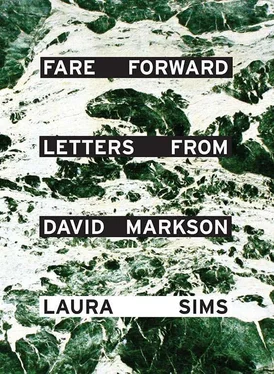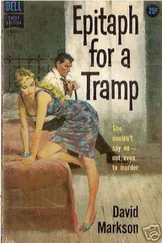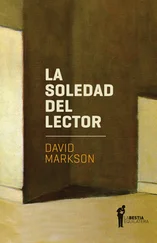Spare them.
With love—
David
112 I’d asked him for the details of his 92 ndStreet Y reading (his first reading ever, he said) so I could tell friends in New York to go.
Hey — Simsy—
Writing this for your return out there. 113How great to have seen you. And I’m excited as hell that you’ll be here in the fall. 114(Or, as you suspect, in Brooklyn.)
But, dammit, I owe you a lunch. I started to pay, and you made us split it, and I never thought about my two wines as opposed to your single lovely pale iced tea. Next time on me.
Next time, also, shut me up once in a while, will you? Three hours after I got home all I could still hear was the sound of my own voice.
Incidentally, on the reverse here, now that’s the girl of my dreams. 115Brooklyn who?
Hey — love to you both—
David
113 He means my return to Madison — I’d gone to New York for a reading. Again I’m not sure why there’s such a long break here between cards, but it could again be because we were talking on the phone more frequently.
114 We’d just learned we’d be moving back to New York, for teaching jobs.
115 He’d uncharacteristically sent me a picture postcard, that iconic close-up shot of a beautiful, green-eyed Afghan girl, taken by Steve McCurry in 1985.
Symsy—
Blessings on your furry little head for the essay! 116And no need to send one. My buddy Carolyn Kuebler, managing editor up there, has me on their freebee subscription list. (She was with Rain Taxi before.) So long as you spelled my name right, what can be bad? 117
Meantime, lots of medical nuisances here, hospital time (brief), etc. Gawd, I hate being 80! Latest prognosis, fair.
Hey, I’ll see you in August. Everything will be better in NY than in Cheese-Land!
Love—
D.
116 I’d finally finished and published an essay on David’s work. It appeared in the Summer 2008 issue of the New England Review and is reprinted in this volume (page 97).
117 He hadn’t seen it yet, obviously, and I was nervous for him to read it, knowing he was easily angered by mistakes (as he perceived them) people made when writing about him.
Simsy—
A quick question, at your new address. 118Why, in your (very good) essay, do you say I called one book This Is Not a Novel because a reviewer did? 119Do I say that, in there? Did I, in casual conversation? I had René Magritte in mind— Ceci n’est pas un pipe —and then remembered Diderot— Not a Conte —and I’m sure (pretty sure) I named both of those in the text. But not what you say. Just curious, because it made me scowl both times I read it. (I did read it twice, honest.)
Gimme a yell in an odd moment while settling in, eh? Otherwise you are contributing to my increasing senility.
Love again—
D.
118 We’d arrived in Brooklyn.
119 This was exactly the kind of response I’d been dreading. At the time, I was positive I had a solid source for that quote — that one reviewer had called Reader’s Block “not a novel,” so David had called his next one This Is Not a Novel as a kind of sarcastic response — but now I don’t recall what my source was, and I don’t remember how I resolved this with David, either.
Simsy, love—
Will you do me a small kindness, in a spare half-minute? I sent postals to half a dozen of the people who wrote in that notebook you passed around at the AWP panel 120—most of whom I knew — but wanted to say six words to one other, who gave me only an e-mail address. And me sans computer, of course. Since she’ll recognize your name, could you send her 10 words telling her of my backwardness, but that I’ve wanted to say thanks for her kind note and only this tardily thought to ask you to do so.
I do appreciate it. And now you learn — do Markson one kindness,* and you’re doomed to be pestered for others eternally!
With school presumably over, I hope you’re writing up a storm. When was that next book due? You guys getting away somewhere, maybe?
Me, I may very well be retired — ex-writer David. Gawd, just awful.
Much love again—
D.
*Rather more than one!
120 In February of 2009, I chaired a panel at the AWP conference, “In Celebration of David Markson,” with panelists Francoise Palleau-Papin, Martha Cooley, M.J. Fitzgerald, Joe Tabbi, and Brian Evenson. As part of the event, we passed a book of index cards around in which audience members could write messages to David. David had written some introductory remarks that were read aloud, too — page 143.
Hey, Symsy—
Why the hell did I put a “y” in there? 121
You OK? Seems like back around Christmas or so when I left you a hello on the machine — and no word since. You are, I hope, writing? And both well?
Meantime nada here. Everything I can think of would be making me repeat myself — and I almost prefer the silence. (Actually, I hate it.)
Hey, all love—
David 122
121 I’d often wondered that myself!
122 My last postcard from David. We talked after this, though, at least once before he died.


David Markson and the Problem of the Novel 123
by Laura Sims
In Markson’s Reader’s Block (Dalkey Archive, 1996), the narrator asks early on:
What is a novel in any case? (
RB
, 13)
To which he adds, musing on the work he anticipates writing, which bears a striking resemblance to Reader’s Block itself:
Nonlinear? Discontinuous? Collage-like?
An assemblage? (
RB
, 14)
At the very end of Reader’s Block, and in the books that follow in this loosely defined tetralogy, including This Is Not a Novel (Counterpoint, 2001), Vanishing Point (Shoemaker & Hoard, 2004), and The Last Novel (Shoemaker & Hoard, 2007), this description reappears, albeit more emphatically; periods have replaced the question marks:
Nonlinear. Discontinuous. Collage-like. An assemblage. (
RB
, 193)
Nonlinear. Discontinuous. Collage-like. An assemblage. (
TINN,
128)
Nonlinear. Discontinuous. Collage-like. An assemblage. (
VP
, 12)
Nonlinear. Discontinuous. Collage-like. An assemblage. (
TINN,
8)
And from his latest book, The Last Novel, after more than a decade of employing this particular form:
Novelist’s personal genre. For all its seeming fragmentation, nonetheless
obstinately cross-referential and of cryptic interconnective syntax. (
TLN,
51)
Vanishing Point begins with a quote from William de Kooning:
Every so often, a painter has to destroy painting. Cezanne did it. Picasso did it with cubism. Then Pollock did it. He busted our idea of a picture all to hell. (
VP
, 1)
And from This Is Not a Novel:
You can actually draw so beautifully. Why do you spend your time making all these queer things?
Picasso: That’s why.
…
Writer has actually written some relatively traditional novels. Why is he spending his time doing this sort of thing?
Читать дальше














